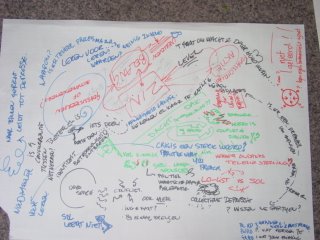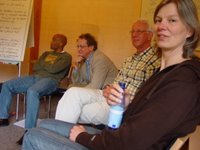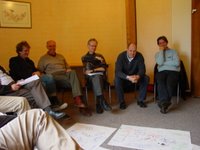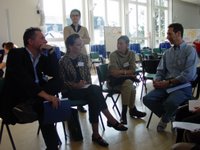
Learning is not control
Learning in order to control behaviour inhibits learning’, I read in a paper by Chris Argyris, somewhere. He called this the Paradox of Organisational Learning
(overview). Typically some people in an organisation (managers) try to control the behaviour of their members. In order to behave responsibly they must detect, reduce and prevent errors a.k.a. they have to be in control or reduce the actions of others. But, at the same time, they want an organisation to be innovative, creative, improve and gain new actions; people must be inventive and learn. However, learning works trough mistakes, trial or errors. The very things that has to be controlled. ‘Learning and control’ is a paradoxical process, leading to a double bind. Managers and managed behave as if they're learning while they're not. And then there is the cover up. In every group live these paradoxes: like those of belonging, engaging and expression.
The concepts of ‘the learning organisation’, as introduced by Peter Senge cum suis in ‘The Fifth Discipline’, try to circumvent paradoxes by hiding or ignoring them. Perhaps the word
discipline is used to invoke the notion of control. Again and again the book comes close to paradoxes, for instance in “Systems Archetypes”, in ‘Mental Models, in “Team Learning”, only to back away again. A paradox is called a dilemma or solutions are suggested. Argyris is very explicit in the notion of paradoxes in organisations and even in his own consultancy practice. He even states that, as is being done in ‘The Fifth Discipline’, the cover up is being covered up. And it is not only LO's that suffer from these 'routines'. We're like fish, swimming in an ocean of paradoxes and unable to detect them.
The word has become flesh: a double bindOne of the recurring topics the LO-discussion list was this: can organisations learn? Is there such a thing as a “learning organisation”? People can learn, people make up an organisation, but is there something like a ‘Learning Organisation’? I personally did and do not encourage assigning human attributes to things, objects. So I use LO as a metaphor only. It only now became clear to me why I have this intuitive notion. People who're learning and learning organisations are of two different types. We have to remember here Bateson's 'Logical Types'. A table belongs to a class of tables. A chair belongs to the class of non-tables. But the 'class of tables' is a class and not a table AND - being a different 'type' - not a member of the class of non-tables. This notion of logical types, introduced by Russell, tries to prevent the occurence of paradoxes in logic and mathematics.
This idea of logical types works perfect, in mathematics. When we encounter a class of self-reflective entities, it runs aground, i think. Human beings belong to the class of Human Beings. An organisation is - amongst others - a class of human beings. But it doesn't belong to the class of Human Beings, it is a different type. It belongs to the class of Organisational Beings. LOgically. But human beings are human beings and
act as if entities of this class behaves as a human being. An organisation belongs to the class of a Human Beings de jure, by law. Clever lawyers have exploited this type-casting (!) to enlarge the power of organisations. It is, adding insult to double bind, called
'Corporation', it is the word turned into flesh. As if an organisation has a body. (The next step would be to say that it has a body of knowledge and say there is such a thing as 'Knowledge Management'. ;-) ) The Corporation is founded on the laws that were meant to abolish slavery (i.e. another logical type). As the corporations (= a class of non-human beings) consist of human beings, self-reflecting loops are created and so are paradoxes.
Crisis, what crisis?There seems to be a deep crisis with the Dutch Society for Organisational Learning. For one, the members think so themselves. The members do not seem to be very committed, there is low trust between members, between members and committees, there are few successful working groups, not enough attendees at conferences etc. Above all, there is a problem with Global Sol, an organisation that seems successful, prides itself at being fractal, and is not prepared to look into this problem. Sol Global is busy developing new concepts and ideas on transformation. However, there are sources who say that Global Sol suffers from the same symptoms as the Dutch.
A few members of Sol-NL decided to look into this issue. Last May was their first meeting. There was a lot of lamenting: we’re in a depression, we’re in the male equivalent of the menopause, we’re in a ‘tragedy of the commons’, members are not open to each other, we’ve lost our purpose, we should look for help from the outside, we have potential, but are unable to realize it. There is not enough commitment, not enough self-reflection. A fact is that many of the members think they want or should belong to a society like this. So there is no problem with belonging, except that other – big organisations – don’t seem to be bothered not being a member. I made at least one conclusion: ‘the society for organisational learning isn’t learning’. It was written down. There are signs of stuckness, stuckness because of a paradox, the paradoxes of engaging.
EngagementThe paradoxes of engaging (
Paradoxes of Group Life - Smith and Berg) are:
disclosure, trust, intimacy and regression. The Sol is caught in the paradox of engagement that runs somewhat liek this:
“I’ll wait to show my commitment (trust, openness, regressing) until this group is offering an environment for commitment (trust, openess, regression...)”.
At the same time, we have a collection of engaged professionals who are very skilfully showing their incompetence in committing.
"Of course", they might say, "we’re committed to organisational learning, as everybody should". It is ‘not done’ to simply state: there is lack of commitment. Why? Because the Sol-NL is caught in the double bind, the catch 22 too. For two reasons: not learning is 'bad' and there is - again - another logical type.
1. If a society for organisational learning admits it isn’t learning, it acts against its very reason of existence. Not only is there the train of thoughts: 'Learning is good ==> not learning is bad; if it isn’t learning ==> it is a bad club ==> we do not want to belong to a bad club', that helps in ignoring this issue.
2. A class of Learning Organisations is now established. This implies there are (?) organisations that don't learn. Clearly, the class of Learning Organisations doesn't belong to this latter class. Borrowing the double bind that exists for organisations, the class we called Corporations, it adds just another standard routine.
The leader who'll comeOne escape seems to be to look for a leader, a liberator to deliver us. (This is the reason I intuitively couldn’t accept a suggestion to become member of the board: I’m not available for deliverance). In learning, this is called a teacher. But Dutch professionals hate being taught twice: firstly because they're Dutch and secondly because they are professionals. And thirdly: by looking for a leader, the society tries to find a way out of the double bind with out addressing it, just as is being done in the ‘The Fifth Discipline’. This fails again and again. And - we all know our archetypes - the leaders are blamed for this failure.
The Society for organisational learning has a hidden paradox: learning is "learning and regression to a state of unlearning". It is called hidden because only one halve of the paradox is acknowledged. Learning is good. There will be no organisational learning without regression. The higher the status of the members, the more difficult it becomes to regress; the lower the status of the members, the easier it is to dismiss the regression as trivial. Yet, regression in a group is ‘normal’.
GrouplearnBion (
Experiences in Groups ) notes that individuals tend to become intellectually regressed when they are in a group. They project some of their own particular characteristics to the group. They become overwhelmed by these attributions they make to the group. In other words, when this regression is not being facilitated, the members start to look for a father-figure, a teacher, a leader, a saviour. They’re craving for control. A group, in its strange and indirect way, asks for its manager. If there is no self control – and there is no self control in unfacilitated regression – there has to come control from the inside (basic assumption: dependency) or the outside (basic assumption: pairing). Remember that making mistakes is the right of children and children only. How can we make mistakes in a group and not become children again? How can we safely regress in a group that looks so powerful and not be crushed? We, again without checking, assume we cannot. So, the dialogue stops and the discussion begins. There is no engagement.
This is, I suppose, what happened. You now can see for yourself how learning, a human characteristic, is being projected on a group: team learning. The teams are supposed to channel their learning, sometimes called "empowered teams", but without the explicit order to make mistakes, to do some regression. So learning is not adequately facilitated. The unmet needs are projected on the manager. The identification with learning is being transferred to the figure we're familiar with: the master, the teacher, the manager. It reinforces the paradigm of control. The manager becomes responsible for the learning of the individual members (Not I, I must say, as a production manager I never walked into this trap; but then again, I assumed that everybody noticed the trap). The average manager knows how to tackle this: invite the Human Resource Department – also not very skilled in expressing regression - to come up with some training, a training the manager himself doesn’t need. And with it the manager declare his (or her) organisation a Learning Organisation. The double bind snaps into place: LO has become another fad of management.
To add insult to injury: this is truer for a highly skilled group that is supposed to facilitate learning: a society for organisational learning. As it imports its own skilfully incompetent learning, it starts to look for ‘big examples’, ‘great names’. It is only natural that this projection is accepted by one or a few persons. This person is not a learner, but a teacher, in this case, take for instance Peter Senge. A society for organisational learning looks for a leader that is a teacher, not a leader that is a moderator, a facilitator for learning. This is how it has always been.
But, as I’ve said, such a teacher is most of the time unable to provide a safe space, an environment for learning to use the power of regression. (By the way: this might be why there is a great demand for facilitating creativity: in working with cards, colours and materials, people can express their regressive sides). This is why I think the Dutch Sol fails massively: of all of the existing societies, it is the most open for its own inability to learn, and it must fail to realize this.
Second loop learningThere is no solution for paradoxes. Somebody once tried by using a bumper sticker reading "Abolish nouns!", that is as close as we can get. These stickers do, however, offer a solution: "abolish solutions".
Paradoxes generate the energy for transformation, alas by firstly creating 'stuckness'. Learning creates a paradox when applied to human beings in an organisation. The paradox of learning: learning is neither good nor bad. There is no ‘bad learning’, nor is there ‘good learning’. Learning is all there is. In order to learn, we'll have to abolish learning first.
This is why we need a setting where there is room for disclosure, trust, intimacy and regression. EVERY organisations IS unsafe for learning. Is it because the manager has not learned to create and sustain such a place? No. Is it perhaps because it is all to easy to accept the projection by the group? No. Is it perhaps because we’re not yet skilled in applying paradoxical thinking? No. It is because we assume learning is childish. I think it is not because we do not want to learn, but because we’ve consistently been taught only one side of the paradox: if in doubt, teach (= control).
Learning is changing changing; learning implies trials, errors, faults, pain and distress. Progress is the Siamese sister of regress. There is no progression without regression. Organisations, called Corporations, made tremendous 'progress' by resisting regression. We're still resisting regression. A Society for Organisational Learning will facilitate its own learning when that portion of the idea, the emotion or action of learning that has been split off from learning in the service of managing the existence of contradictions inherent in learning, is reclaimed or brought back. We're facing our own development.






